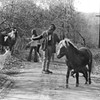Published March 17, 2004 at 5:00 p.m.
In this chaotic world, two Chittenden County women are trying to help people find direction. Mary Beth Morrisseau and Robyn Yurcek, both 42, followed their own circuitous itineraries before becoming certified life coaches. In addition to their private practices, three months ago they launched a joint venture called What If…Productions. It offers individual clients and businesses an approach to "learning, change, growth, evolution and ultimately fulfillment." That's a quote from their brochure, which also promises "a combination of self-discovery, creative tools and improv to get you someplace faster and with more clarity."
And just where is everyone going? The answers, it seems, are close at hand: Morrisseau and Yurcek encourage seekers to become the source of their own enlightenment. "They map it out, they take the journey, they claim the results," suggests Morrisseau, a Burlington native now living in Colchester. Ohio-born Yurcek, a Winooski resident, adds: "One of our premises is that each person has the good stuff within them."
This particular way to search for the good stuff began in the late 1980s with Leonard Thomas, an Arizona-based financial planner. He devised the life-coach concept by synthesizing ideas from counseling, ministering, advising and mentoring. In workshop settings, Morrisseau and Yurcek use games, exercises and artistic tasks to facilitate what they call "sustainable change." But much of the one-on-one coaching takes place over the phone, typically once a week for a half-hour session. The aim of these conversations is to help the client begin shaping his or her life, rather than merely reacting to it.
SEVEN DAYS: How did you two get into this line of work?
MARY BETH MORRISSEAU: I was a machinist at General Electric's armaments division from 1980 to 1985. It never took hold in my mind that they were making guns. But when the company downsized, I got a job in the service department at a car dealership. I also studied at Trinity College and earned a B.A. in 1996. My major was human-resource development, because I wanted to begin using my voice and brains, instead of my hands.
SD: That did the trick?
MBM: Yes. Burton Snowboards hired me for a position that concentrated on employee safety and health issues. After a few years I went to Tensolite, an Essex firm that made semi-conductor components. When they downsized in the late 1990s, I began commuting to Platts-burgh as a human-resources manager at Bombardier Transportation. During that time, I had a life coach of my own for several months and realized it was a field I wanted to move into.
SD: How were you able to accomplish that?
MBM: Through the International Coach Federation website I got involved with Coach for Life, which is in California.
SD: You went there?
MBM: No. I did a week's training in Minneapolis, then nine months at home with teleclasses. I began coaching in 2001. I quit Bombardier -- and then they asked me to coach for them.
SD: What about you, Robyn?
Robyn Yurcek: Well, I went to college in New Mexico, dropped out, moved to Vermont in the early 1980s and had a job with the YMCA after-school program. But I left the state to do a yearlong anthropological survey for the U.S. military. We measured 10,000 military personnel around the country to resize things like uniforms, helmets and cockpits.
SD: You were formulating a new norm?
RY: Yes, there were 20 of us. We each had the responsibility for a different body measurement. Mine was breadth.
SD: And after that?
RY: I was a waitress in Indiana, went back to school in Ohio, and then returned here in 1990 for an internship that didn't pan out. I did Montessori home-schooling, and later trained as an HIV educator while volunteering at Vermont CARES. While working as a chiropractic assistant for four years, I discovered my passion: life coaching. I downloaded everything I could find on the Internet. I locked myself in the bedroom [to read it all] and didn't come out for hours. It was a spiritual experience.
SD: What practical steps did you take?
RY: I went to a satellite branch of the Coaches Training Institute in Rhode Island once a month for six months, followed by a certification program for another six months. I got my license in 2001.
SD: So, as women who personally struggled to reach the right path, you are essentially poster children for life coaching. What do you each bring to the mix?
RY: I'm very focused on relationships. I support people in them as the expert decision-makers and inventors of their own lives.
MBM: My coaching is centered on creativity and innovation. I'm a painter, and I've finally found a way to use my own artistic abilities to nurture others.
SD: How does life coaching differ from, say, psychotherapy?
MBM: A lot of therapy is about how you got to now. Coaching is about now and moving forward. Talking about the past is only a point of reference in figuring out where you want to go.
RY: It's taking external actions to overcome internal blocks. People are not broken; they're not problems to be fixed. Coaching explodes the myths we have about ourselves so we can face the gremlins that stop us from changing.
SD: Any examples of success?
MBM: One client had a five-year plan to start his own business, yet hadn't spent much time imagining that actually happening. Within six months of coaching, he had constructed a building and was ready to roll. Before, he didn't believe he could really do it. People are scared.
RY: The clients who hire us are often eager to do something they've never done and have something they've never had. Our first step is always to establish the vision of where you want to be.
SD: What about corporate visions?
RY: Remax North, a real-estate company, came to us because they wanted to get outside the box. Mary Beth and I specialize in outside the box. The first thing we did at the retreat in November was to rearrange tables that were set up in a box pattern. It initially freaked the client out.
MBM: But their goal was to be "remarkable," so that started the day off fabulously. Even though we weren't yet What If…Productions then, the experience solidified our work together.
SD: You have thriving individual practices. What's the appeal of also collaborating?
MBM: I'm a go-with-the-flow person. Robyn prefers more structure. Our styles really complement each other.
RY: It's the balance.
MBM: It's the balance.
More By This Author
Speaking of Business
-

Vermont to Open $20 Million Business Flood Relief Fund
Jul 27, 2023 -

Video: Following Seven Days' Paper Trail to Québec
Jun 21, 2023 -

Rochester Grocery Store to Close, Leaving Residents in the Lurch
Apr 24, 2023 -

Video: Saying Goodbye to Burlington’s Penny Cluse Café
Nov 17, 2022 -

Essay: Natalie Miller Riffs on How Her Nightclub Survived the Pandemic
Sep 14, 2022 - More »
Comments
Comments are closed.
From 2014-2020, Seven Days allowed readers to comment on all stories posted on our website. While we've appreciated the suggestions and insights, right now Seven Days is prioritizing our core mission — producing high-quality, responsible local journalism — over moderating online debates between readers.
To criticize, correct or praise our reporting, please send us a letter to the editor or send us a tip. We’ll check it out and report the results.
Online comments may return when we have better tech tools for managing them. Thanks for reading.











































